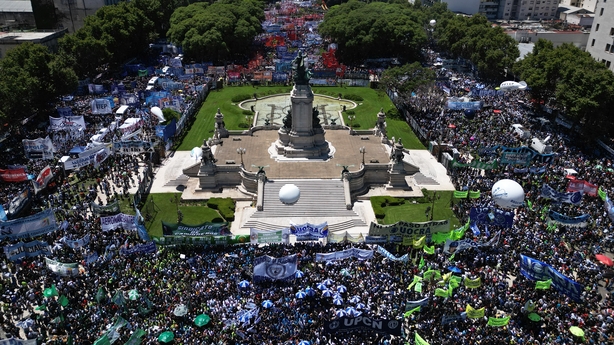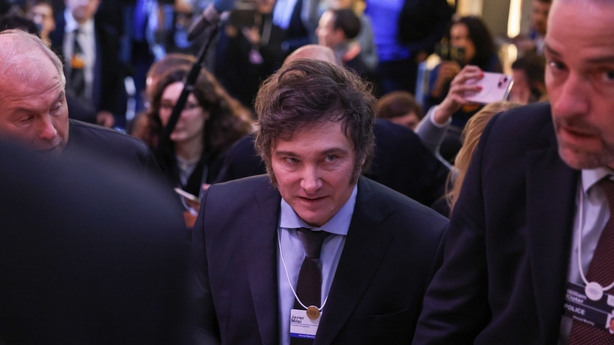President of Argentina Javier Milei has faced the first major challenge to his budget-slashing policies as workers downed tools en masse and took to the streets in protest.
Thousands gathered by midday in the centre of Buenos Aires (3pm Irish time) for what is expected to be the biggest demonstration in years, called by the South American country's main union, the CGT, with some seven million members.
Protesters bore placards reading: "The homeland is not for sale" and "Eating is not a privilege" as they marched and held aloft a giant puppet in the image of Mr Milei.
Another poster proclaimed: "Today's retirees are yesterday's workers, stop robbing them!"
Mr Milei took office in December after a campaign vowing to cut public spending.
The new president announced a set of sweeping reforms, ten days after he came to power, that lessened some worker protections, abolished a price ceiling on rent and lifted price controls on certain consumer goods.

Poverty levels in Latin America's third-biggest economy are at 40% and the country is battling annual inflation exceeding 200% after decades of financial mismanagement.
"People are angry... nobody can deny it," said CGT co-leader Hector Daer.
The main rally in the capital was outside parliament, where politicians are discussing Mr Milei's package of deregulation and economic reform, which many in the country fear will leave them vulnerable to exploitation and poorer.
Demonstrations have also been called for numerous other cities and towns, even abroad in Madrid, Paris and Brussels.
The CGT has been joined by other, smaller unions and civic groups, vowing to "not yield an inch of what has been achieved" in terms of labor and consumer protections, according to CGT leader Pablo Moyano.
Air traffic was affected early by the strike, with Aerolineas Argentinas cancelling nearly 300 flights, including international ones, "affecting more than 20,000 passengers" for a loss of about $2.5 million (€2.2 million), according to the company.
Security Minister Patricia Bullrich insisted on X that "The country does not stop!" claiming that protester "mobilization is small compared to the number of people who have decided to go to work."
The government has vowed to stick to its reform plan, and Ms Bullrich denounced "mafia labor unions, managers of poverty, complicit judges and corrupt politicians... who resist the change democratically decided by society."
Never before has a mass strike been called so soon into the term of a new Argentine government with this occurring after just 45 days.
The government is resisting the challenge.
It has set up an anonymous, toll-free line for people to report "threats and pressure" on workers to stay away from their jobs.
It has also said it will take a day of pay from each striking public servant and will hand unions the bill for police deployment.
'Mega-decree'

Mr Milei's reforms are being challenged on several fronts, with more than 60 lawsuits under way.
One chapter of the so-called "mega decree", dealing with labor reforms, has already been frozen by a court pending a review by congress.
Among other things, it sought to increase the job probation period from three to eight months, reduce compensation in case of dismissal and cut pregnancy leave.
For the rest of the decree, which also envisages privatisation of state enterprises, the government is putting pressure on politicians for a quick adoption, but is facing some resistance from the center-right opposition.
Mr Milei's party is only the third-biggest group in parliament.
The economy, too, has resisted Mr Milei's attempts to boost export competitiveness by devaluing the peso by more than 50% last month.
"What was gained in competitiveness is lost with inflation," economist Martin Epstein told AFP.
In yet another blow to his reforms, Mr Milei's government has had to walk back a plan to cut public funding of the film industry after a backlash from the sector drew backing of international stars including Spanish director Pedro Almodovar.

